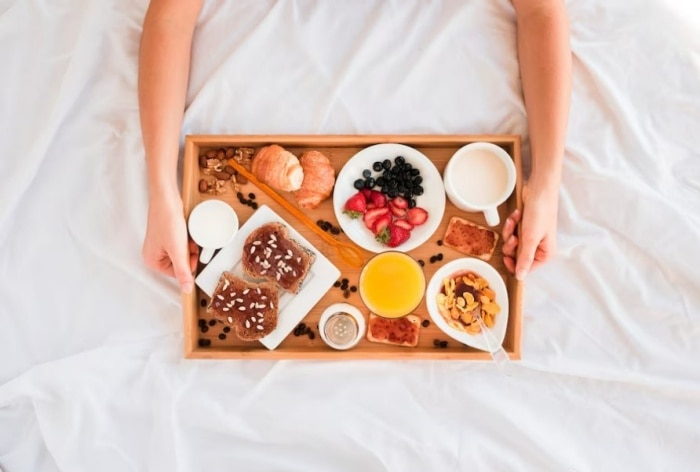A lot takes place inside the body when one is asleep. Our body needs that time to rest. Therefore, it is better to push up good sleep in the priority sleep and reduce any risk for our overall health.

A complete sleep of nearly seven to eight hours every day is extremely important for every adult. It is not merely about the number of hours one sleep but also about the quality of sleep too. There are health conditions that might develop due to lack of good quality slumber. There are several people who will report of not sleeping well or not getting enough sleep. There are several lifestyle changes that require tweaking for a better sleep cycle, however, there are a few solutions sitting just inside your kitchen shelves.
Diet plays an important role in the optimal functioning of the body. Dietary practices impact blood pressure, cholesterol weight etc which in turn have effect on sleep too.
“We’re finding more evidence that improving your diet can lead to better sleep,” said Marie-Pierre St-Onge, director of the Center of Excellence for Sleep and Circadian Research at Columbia University Irving Medical Center in New York as quoted by the Washington Post. “All of the research is pointing toward similar findings: The foods and dietary patterns that are associated with better sleep tend to be lower in glycemic index (meaning they have less effect on blood sugar levels), low in saturated fat, low in added sugars and high in fiber.”
Here are a few nutrients that should be added to the diet for improving sleep quality.
- A lack of vitamin B6 has been linked to symptoms of insomnia and depression. Vitamin B6 aids in the production of the hormones serotonin and melatonin, both of which are important to sound, restful sleep, and also to mood.
- A deficiency in iron has an effect on sleep quality, quantity and timing; iron also affects the modulation of REM sleep. Amaranth, bajra, barley, lentils, soyabean, dates are rich sources of iron
- Magnesium is another crucial component for sleep that helps your brain and body relax and get ready for sleep. Magnesium acts on a similar pathway in your brain as anti-anxiety drugs, so it helps your body wind down and get into sleep mode. Some of the best sources of magnesium are nuts, spinach, banana, avocado, and potatoes.
- Low blood serum levels of vitamin D—less than 20 ng/mL—can increase risk of sleep disorders and is associated with sleep difficulties, shorter sleep duration, and nocturnal awakenings. Mushroom., egg yolk
- Adequate intake of omega-3 polyunsaturated fatty acids (n-3 PUFAs), which include docosahexaenoic acid (DHA) and eicosapentaenoic acid (EPA is associated with better sleep quality. Ghee, flaxseed, chia seeds, and walnuts are all great sources of omega-3 fats. Best sources of this B vitamin are chickpeas, potatoes, and bananas.
A path towards a healthy and good sleep cycle is not just eating right, it is a combination of food, lifestyle practises. Here are a few lifestyle changes to make:
- Stick to a consistent sleep schedule: Try to go to bed and wake up at the same time every day, including weekends.
- Create a sleep-conducive environment: Make sure your bedroom is dark, cool, and quiet. Consider using blackout curtains, earplugs, or a white noise machine to help you sleep.
- Avoid stimulating activities before bedtime: Avoid using electronic devices such as smartphones or laptops before bed, as the blue light emitted from these devices can interfere with your sleep. Also, avoid consuming caffeine, alcohol, and nicotine before bed.
- Exercise regularly: Regular exercise can help improve sleep quality. However, try not to exercise within a few hours of bedtime as it can be stimulating.
- Practice relaxation techniques: Techniques such as deep breathing, meditation, or yoga can help reduce stress and promote relaxation, which can help you sleep better.
- Daytime naps: If you must nap during the day, try to limit it to 30 minutes and avoid napping late in the day.
- Choose a comfortable mattress and pillows: Make sure your mattress and pillows are comfortable and supportive. If your mattress is over 10 years old, consider replacing it.
A lot takes place inside the body when one is asleep. Our body needs that time to rest. Therefore, it is better to push up good sleep in the priority sleep and reduce any risk for our overall health.
Stay connected with us on social media platform for instant update click here to join our Twitter, & Facebook
We are now on Telegram. Click here to join our channel (@TechiUpdate) and stay updated with the latest Technology headlines.
For all the latest Lifestyle News Click Here
